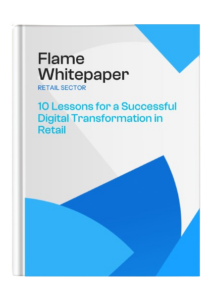Digital transformation in retail is not just an option but a necessity to stay relevant and successful. One of the most emblematic examples of innovation in this field has been Amazon’s attempt to implement automated stores. These stores, designed to revolutionize the shopping experience by eliminating lines and improving efficiency, did not fully meet expectations.
In this webinar, we explore what went wrong with this project and how we can learn from those mistakes to optimize our own digitalization processes.
How to Achieve a Successful Digital Transformation?
Lesson 1: Improve Store Layout with Zone Analytics and Heat Maps
The layout of a retail establishment can significantly impact the customer experience. Using zone analytics and heat maps helps identify the most and least frequented areas of the store, facilitating a space organization that improves circulation and accessibility of the most popular products.
Lesson 2: Enhance the Storefront with Pedestrian and Visit Analysis
The storefront is the first point of contact with the customer. Analyzing pedestrian data helps understand what captures their attention and converts them into effective visits. This may include adjustments in design and the products displayed.
Lesson 3: Optimize Product Placement with Heat Maps
Similar to the general store layout, the strategic placement of specific products can be optimized with heat maps. This allows retailers to position products in a way that maximizes visibility and attraction in high-traffic areas.
Lesson 4: Increase Average Ticket Value with Conversion and Visits
Analyzing the relationship between the number of visits and effective conversions can provide insights on how to increase the average ticket value. This could include strategies like placing complementary products together or promotions at strategic points in the store.
Lesson 5: Optimize Pricing Strategy with Heat Maps and Conversion
Price is a critical factor in the purchase decision. Using analytics to adjust prices based on demand in different areas of the store can help maximize revenue without sacrificing competitiveness.
Lesson 6: Optimize Opening and Closing Hours with People Counters
Analyzing customer flow during different hours and days allows for adjusting opening and closing times to maximize operational efficiency and customer satisfaction.
Lesson 7: Improve Staff Management with People Counters
Determining the necessary amount of staff at different times can be optimized with systems that count the number of people in the store. This helps improve customer service during peak times and reduce costs when activity is lower.
Lesson 8: Enhance Shopping Experience and Loyalty with Data on Repeat Visits and Dwell Time
Understanding how and when customers repeat their visits, as well as the duration of their stay, can provide valuable insights to improve the shopping experience and increase loyalty.
Lesson 9: Improve Marketing and Personalization Strategies
Using data to personalize the customer experience is fundamental. This includes everything from personalized offers and promotions to product recommendations based on previous purchase behavior.
Lesson 10: Leverage Technology to Innovate and Create New Business Models
Learning from the mistakes and successes of others, such as in the case of Amazon’s automated stores, can inspire the creation of new business models that better align with current consumer expectations and technological possibilities.
Learn with Digital Transformation in retail
Amazon’s attempt to revolutionize retail with automated stores offers valuable lessons on the importance of adapting technology to the real needs of the market. Retail companies that wish to succeed in their digital transformation must consider these lessons and adapt them to their specific context and objectives. By using data analytics strategically, retail can not only meet but exceed customer expectations.
Download our whitepaper for more info

Ask us for the video if you missed the webinar








 People Counting
People Counting Conversion Analytics
Conversion Analytics Customer Behavior
Customer Behavior Occupancy Management
Occupancy Management Queue Analytics
Queue Analytics Restroom Management
Restroom Management Guest Wifi Marketing
Guest Wifi Marketing Corporate WiFi Access
Corporate WiFi Access Retail
Retail Shopping malls
Shopping malls Hospitality
Hospitality Public Venues
Public Venues